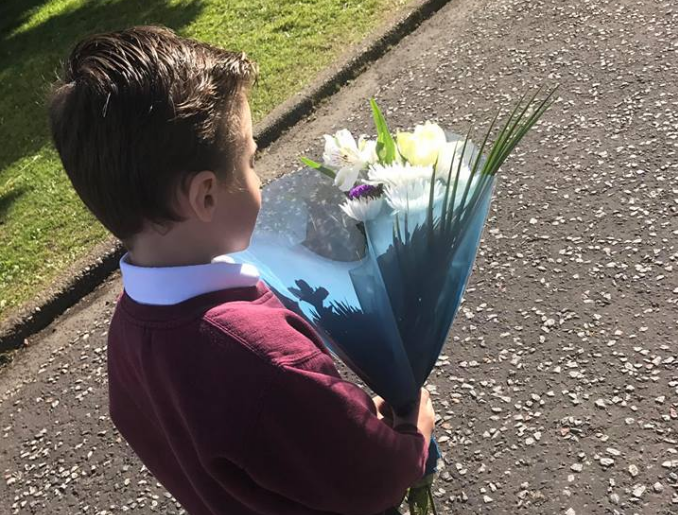When U.K. mom Zowiie Williams heard that her six-year-old son Callum had been disrespectful to a girl at school, she wasn’t ready to let that fly. But instead of punishing him, she used the moment as a teaching opportunity – and it’s melting the hearts of social media users everywhere.

Earlier this month, Callum had broken up with his “girlfriend’ after one of his friends told him to. When he did, he used inappropriate language towards the little girl, Williams told Metro.
READ MORE: Are you hurting your child’s self-esteem by retouching their photos?
According to Williams, Callum was feeling remorseful and told his mom what had happened. After learning the girl had left school upset that day, Williams sat down with Callum to come up with a plan on how to properly apologize.
And that’s when they decided on a plan.
“Today he is marching into school with flowers and an apology because I feel that we need to teach boys the importance of how they should react to certain situations,” Williams said on Facebook. “Callum now understands that what other people think or say should not sway him into acting like he doesn’t care about other people’s feelings.”
Williams told Metro that the flowers were Callum’s idea.
“I also explained that buying flowers won’t automatically fix the problem and made sure that he understood he couldn’t be mean and expect anything materialistic to fix what he says, and that it is never okay to be mean to anyone especially a girl,” she said to Metro. “It’s something I feel very strongly about.”
Williams’ lesson resonated with other parents on social media.
“There’s a wee boy being raised right, and who will grow to be a respectful member of society,” Lauren Taylor wrote on Facebook. “This is awesome!”
“This is beautiful,” Stacy Foley said. “I love that you’re not the type of parent who thinks their child is always a little angel and made him aware when he has done something wrong.”
READ MORE: Where’s the village? Why parents should ask for more help raising kids
“Amazing,” Nadya Whiteside wrote. “I am sure he will bring this with him as he grows into a gentleman. You are doing such an amazing job.”
When it comes to teaching children the concept of respect, Gail Bell and Julie Freedman-Smith, co-founders of ParentingPower.ca, say it’s never too early.
“We start teaching kids about respect from the moment they are infants,” Feedman-Smith says. “Kids learn what they live, and live what they learn. So if we want kids to know about treating people with respect, we need to make sure that that’s what we’re modelling.”
In moments like this, the best way to have the life lesson of respect stick and make a difference is to make it a collaborative effort, Bell and Freedman-Smith say.
So Bell and Freedman-Smith say parents should sit down with their kids and identify the need of an apology to the child. How the child decides to carry out that apology should be up to them. But since kids may not know where to start, brainstorming ideas is a good way to go, and then give them a timeframe on when they’re expected to make that apology.
“We think that having kids make amends for what they’ve done is an important thing because we make mistakes and learn from them and then hope not to make those same mistakes again,” Freeman-Smith says.






Comments